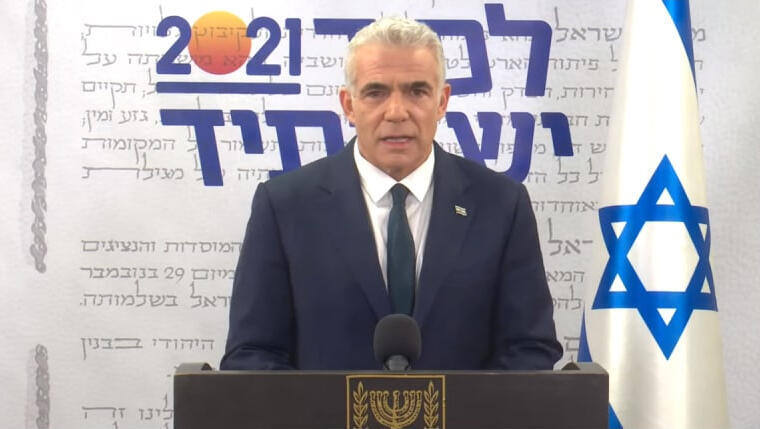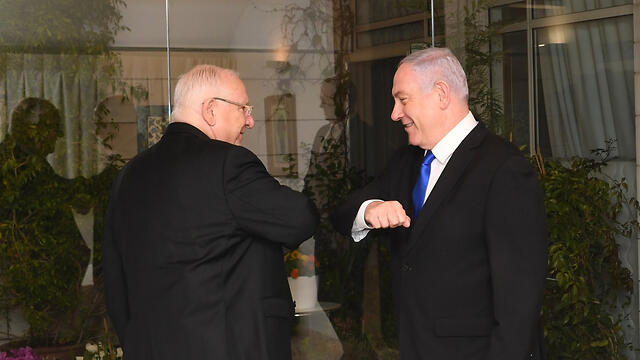Getting your Trinity Audio player ready...
In an effort to avoid unprecedented fifth elections in two years, a reluctant President Reuven Rivlin on Tuesday picked Prime Minister Benjamin Netanyahu as the candidate to form a new government after he emerged with the most endorsements from fellow lawmakers.
Netanyahu received the recommendations of 52 lawmakers in the 120-member Knesset in Rivlin's consultations on Monday, as Jerusalem District Court saw the start of the evidentiary stage of the prime minister's trial for bribery, fraud and breach of trust.
3 View gallery


President Reuven Rivlin announcing Tuesday that he was tapping Prime Minister Benjamin Netanyahu to form the next government
(Photo: GPO)
Centrist Opposition Leader Yair Lapid of the Yesh Atid party got 45 endorsements and former defense minister Naftali Bennett of the far-right Yamina got seven - all from his own party.
The breakaway right-wing New Hope led by former Likud minister Gideon Saar and the two predominantly Arab parties, Joint List and Ra'am, declined to endorse any candidate, leaving their combined 16 seats in the wind. Pleas from both Netanyahu and Lapid for support to make up their respective majority shortfalls went unanswered.
The deadlock over recommendations was a reflection of the political stalemate in the country, which held elections on March 23 - the fourth time in two years - only for the outcome to again be inconclusive.
3 View gallery


Yesh Atid leader Yair Lapid calling Monday for Naftali Bennett and Gideon Saar to join him in his efforts to unseat Benjamin Netanyahu as prime minister
Rivlin said Tuesday that he felt none of the candidates had a chance of putting together a viable coalition but as he was obliged by law, he was resigned to tasking the prime minister with forming the next government.
"I know the position held by many, that the president should not give the role to a candidate that is facing criminal charges, but according to the law and the decision of the courts, a prime minister can continue in his role even when he is facing charges," Rivlin said in a televised address from his Jerusalem residence.
"Moreover, the question of giving the role to a candidate facing criminal charges was one of intense political and public disagreement over the recent election campaigns," he said.
But, Rivlin said, the decision "on the substantive and ethical question of the fitness of a candidate facing criminal charges to serve as prime minister" was not his to make.
"The President of the State of Israel is not a substitute for the legislature or for the judiciary," he said. "In this situation and in the absence of other options, I received my decision in accordance with the map of recommenders, which indicates a slightly higher chance of MK Benjamin Netanyahu forming a government," Rivlin concluded.
3 View gallery


President Reuven Rivlin greets Prime Minister Benjamin Netanyahu, March 2020
(Photo: GPO)
Yesh Atid leader Yair Lapid said in response that although Rivlin "fulfilled his duty and was left with no other choice," his decision to task Netanyahu with the formation of Israel's next government was "a mark of shame for Israel and a shame for its status as a law-abiding state."
Naftali Bennett, who heads Yamina, on the other hand was less pessimistic, telling reporters he "wishes luck" to Netanyahu in his attempt to form a coalition. "We will leave no stone unturned on a mission to prevent fifth elections, but without sacrificing our values," he said.
Netanyahu, who is Israel's longest-serving leader and in power consecutively since 2009, now has 28 days to try to put together a coalition.
He can request a two-week extension from Rivlin, who has the option of later assigning the task to someone else if the prime minister is unsuccessful.

